Engine Unit -- Inspection |
| 1. INSPECT NO. 1 IDLE GEAR OIL CLEARANCE |
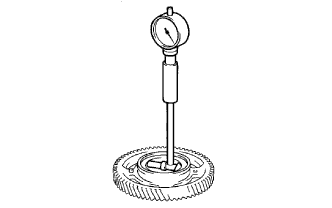 |
Using a cylinder gauge, measure the inside diameter of the idle gear.
- Standard idle gear inside diameter:
- 44.000 to 44.025 mm (1.7323 to 1.7333 in.)
Using a micrometer, measure the diameter of the idle gear shaft.
- Standard idle gear shaft diameter:
- 43.955 to 43.990 mm (1.7305 to 1.7319 in.)
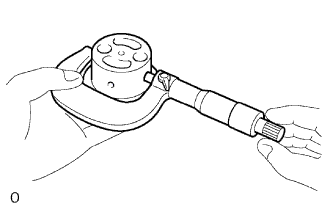 |
Subtract the idle gear shaft diameter measurement from the idle gear inside diameter measurement.
- Standard oil clearance:
- 0.010 to 0.070 mm (0.0004 to 0.0028 in.)
- Maximum oil clearance:
- 0.20 mm (0.0079 in.)
| 2. INSPECT CYLINDER HEAD SET BOLT |
 |
Using a vernier caliper, measure the minimum outside diameter of the compressed thread at the measuring point A.
- Standard outside diameter:
- 11.8 to 12.0 mm (0.465 to 0.472 in.)
- Minimum outside diameter:
- 11.6 mm (0.457 in.)
| 3. INSPECT SUPPLY PUMP GEAR BEARING |
Check that the bearing is not rough or worn.
If necessary, replace the supply pump gear.
| 4. INSPECT CYLINDER BLOCK OIL ORIFICE |
Check the oil orifice for damage or clogging.
If necessary, replace the oil orifice.
| 5. INSPECT OIL CHECK VALVE SUB-ASSEMBLY |
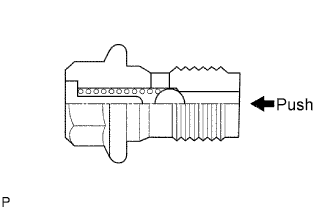 |
Push the valve with a wooden stick to check if it is stuck.
If stuck, replace the check valve.
| 6. INSPECT NO. 1 OIL NOZZLE SUB-ASSEMBLY |
Check the oil nozzles for damage or clogging.
If necessary, replace the oil nozzle.
| 7. CLEAN CYLINDER BLOCK SUB-ASSEMBLY |
 |
Using a gasket scraper, remove all the gasket material from the top surface of the cylinder block.
Using a soft brush and solvent, thoroughly clean the cylinder block.
| 8. INSPECT CYLINDER BLOCK SUB-ASSEMBLY |
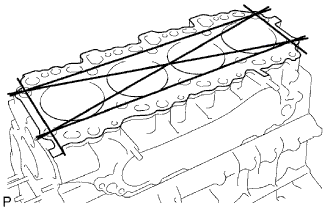 |
Inspect for flatness.
Using a precision straightedge and feeler gauge, measure the surface contacting the cylinder head cap for warpage.
- Maximum warpage:
- 0.10 mm (0.0039 in.)
Visually check the cylinder for vertical scratches.
If deep scratches are present, rebore all 4 cylinders. If necessary, replace the cylinder block.
 |
Inspect the cylinder bore diameter.
- HINT:
- There are 3 standard cylinder bore diameter sizes, marked 1, 2 and 3 accordingly. The mark is stamped on the lower left rear of the cylinder block.
Using a cylinder gauge, measure the cylinder bore diameter at positions A, B and C in the thrust and axial directions.
- Standard diameter:
Mark 1 Mark 2 Mark 3 96.000 to 96.010 mm (3.7795 to 3.7799 in.) 96.010 to 96.020 mm (3.7799 to 3.7803 in.) 96.020 to 96.030 mm (3.7803 to 3.7807 in.)
- Maximum diameter:
STD O/S 0.50 O/S 0.75 O/S 1.00 96.23 mm (3.7886 in.) 96.73 mm (3.8082 in.) 96.98 mm (3.8181 in.) 97.23 mm (3.8279 in.)
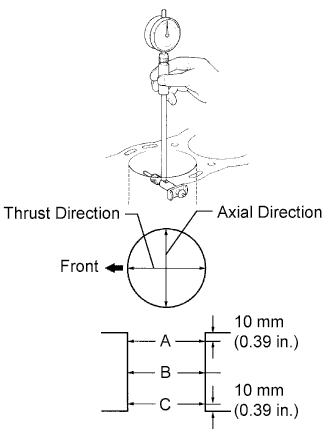
 |
Remove the cylinder ridge.
If the wear is less than 0.2 mm (0.008 in.), using a ridge reamer, grind the top of the cylinder.
 |
| 9. CLEAN PISTON |
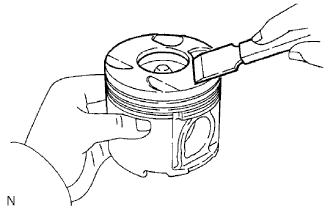 |
Using a gasket scraper, remove the carbon from the piston top.
Using a groove cleaning tool or broken ring, clean the piston ring grooves.
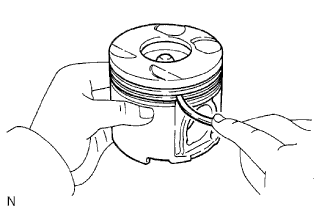 |
Using solvent and a brush, thoroughly clean the piston.
- NOTICE:
- Do not use a wire brush.
 |
| 10. INSPECT PISTON SUB-ASSEMBLY |
 |
Inspect the piston oil clearance.
- HINT:
- There are 3 standard piston diameter sizes, marked "1", "2" and "3" accordingly. The mark is stamped on the piston top.
Using a micrometer, measure the piston diameter according to the following conditions: 1) measure at a right angle to the piston center line, and 2) measure at the indicated distance from the piston head.
- Standard distance:
- 63.63 mm (2.5051 in.)
- Standard piston diameter:
Piston Mark Diameter STD Mark 1 95.92 to 95.93 mm (3.77637 to 3.77676 in.) STD Mark 2 95.93 to 95.94 mm (3.77676 to 3.77715 in.) STD Mark 3 95.94 to 95.95 mm (3.77716 to 3.77755 in.) O/S 0.50 - 96.42 to 96.70 mm (3.7960 to 3.8070 in.) O/S 0.75 - 96.67 to 96.95 mm (3.8058 to 3.8169 in.) O/S 1.00 - 96.92 to 97.20 mm (3.8157 to 3.8267 in.)
Measure the cylinder bore diameter in the thrust directions.
Subtract the piston diameter measurement from the cylinder bore diameter measurement.
- Standard oil clearance:
- 0.070 to 0.090 mm (0.0028 to 0.0035 in.)
- Maximum oil clearance:
- 0.14 mm (0.0055 in.)
If necessary, replace the cylinder block.- HINT:
- Use a piston with the same number mark as the cylinder diameter marked on the cylinder block.
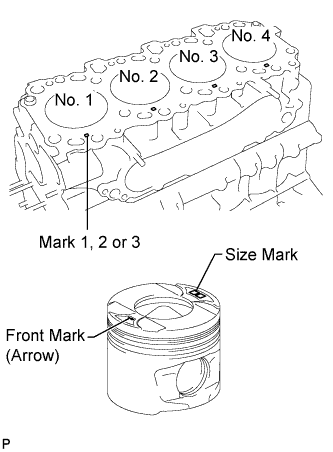
Using a micrometer, measure the piston pin diameter.
- Standard piston pin diameter:
- 33.996 to 34.008 mm (1.3384 to 1.3389 in.)
 |
Inspect the piston pin fit.
At 80°C (176°F), check that the piston pin can be pushed into the piston pin hole with your thumb.
If the pin can be installed at a lower temperature, replace the piston and pin as a set.
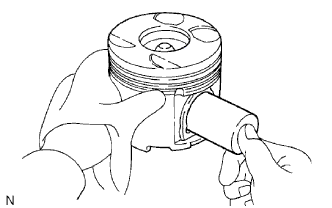 |
| 11. INSPECT PISTON RING SET |
 |
Inspect the piston ring groove clearance.
Using a feeler gauge, measure the clearance between a new piston ring and the wall of the ring groove.
- Standard groove clearance:
No. 1 No. 2 Oil 0.091 to 0.135 mm (0.0036 to 0.0053 in.) 0.090 to 0.130 mm (0.0036 to 0.0051 in.) 0.030 to 0.075 mm (0.0012 to 0.0027 in.)
- Maximum groove clearance:
- 0.20 mm (0.079 in.)
Inspect the piston ring end gap.
Insert the piston ring into the cylinder bore.
Using a piston, push the piston ring a little beyond the bottom of the ring travel and 120 mm (4.72 in.) from the top of the cylinder block.
Using a feeler gauge, measure the end gap.
- Standard end gap:
No. 1 No. 2 Oil 0.27 to 0.39 mm (0.0106 to 0.0154 in.) 0.47 to 0.57 mm (0.0185 to 0.0224 in.) 0.20 to 0.40 mm (0.0079 to 0.0157 in.)
- Maximum end gap:
No. 1 No. 2 Oil 0.85 mm (0.0335 in.) 1.07 mm (0.0421 in.) 0.77 mm (0.0303 in.)
If the end gap is greater than the maximum even with a new piston ring, rebore all 4 cylinders or replace the cylinder block.

 |
| 12. INSPECT CONNECTING ROD SUB-ASSEMBLY |
 |
Using a rod aligner and feeler gauge, check the connecting rod alignment.
Check if the rod is bent.
- Maximum bend:
- 0.03 mm (0.0012 in.) per 100 mm (3.94 in.)
Check if the rod is twisted.
- Maximum twist:
- 0.15 mm (0.0059 in.) per 100 mm (3.94 in.)

| 13. INSPECT PISTON PIN OIL CLEARANCE |
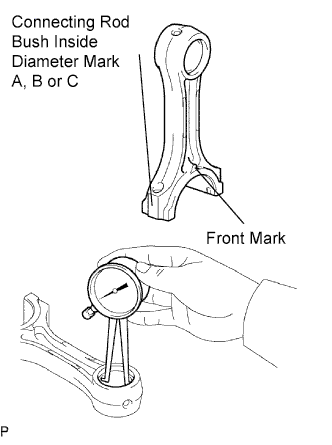 |
Inspect the piston pin oil clearance.
Using a caliper gauge, measure the inside diameter of the connecting rod bush.
- Standard bush inside diameter:
Size Mark Diameter A 34.012 to 34.016 mm (1.3390 to 1.3392 in.) B 34.016 to 34.020 mm (1.3392 to 1.3393 in.) C 34.020 to 34.024 mm (1.3392 to 1.3395 in.)
Subtract the piston pin diameter measurement from the bush inside diameter measurement.
- Standard oil clearance:
- 0.012 to 0.024 mm (0.0005 to 0.0009 in.)
- Maximum oil clearance:
- 0.03 mm (0.012 in.)
If necessary, replace the piston and piston pin with a new piston and pin set.
| 14. INSPECT CONNECTING ROD BOLT |
 |
Using a vernier caliper, measure the tension portion of the connecting rod bolt.
- Standard diameter:
- 8.500 to 8.600 mm (0.3346 to 0.3385 in.)
- Minimum diameter:
- 8.30 mm (0.3268 in.)
| 15. INSPECT NO. 1 BALANCE SHAFT SUB-ASSEMBLY |
 |
Using a cylinder gauge, measure the inside diameter of the balance shaft bearing.
- Bearing inside diameter:
No. 1 No. 2 No. 3 42.000 to 42.020 mm (1.6535 to 1.6543 in.) 41.000 to 41.020 mm (1.6142 to 1.6150 in.) 32.000 to 32.020 mm (1.2598 to 1.2606 in.)
Using a micrometer, measure the outside diameter of the balance shaft main journals.
- Main journal diameter:
No. 1 No. 2 No. 3 41.941 to 41.960 mm (1.6512 to 1.6520 in.) 40.931 to 40.950 mm (1.6115 to 1.6122 in.) 31.941 to 31.960 mm (1.2575 to 12583 in.)
 |
Subtract the outside diameter of the balance shaft main journal from the inside diameter of the balance shaft bearing.
- Standard clearance:
No. 1 No. 2 No. 3 0.040 to 0.079 mm (0.0016 to 0.0031 in.) 0.040 to 0.079 mm (0.0016 to 0.0031 in.) 0.050 to 0.089 mm (0.0020 to 0.0035 in.)
- Maximum oil clearance:
No. 1 No. 2 No. 3 0.18 mm (0.0071 in.) 0.19 mm (0.0075 in.) 0.18 mm (0.0071 in.)
| 16. INSPECT NO. 2 BALANCE SHAFT SUB-ASSEMBLY |
 |
Using a cylinder gauge, measure the inside diameter of the balance shaft bearing.
- Bearing inside diameter:
No. 1 No. 2 No. 3 42.000 to 42.020 mm (1.6535 to 1.6543 in.) 41.000 to 41.020 mm (1.6142 to 1.6150 in.) 32.000 to 32.020 mm (1.2598 to 1.2606 in.)
Using a micrometer, measure the outside diameter of the balance shaft main journals.
- Main journal diameter:
No. 1 No. 2 No. 3 41.941 to 41.960 mm (1.6512 to 1.6520 in.) 40.931 to 40.950 mm (1.6115 to 1.6122 in.) 31.941 to 31.960 mm (1.2575 to 12583 in.)
 |
Subtract the outside diameter of the balance shaft main journal from the inside diameter of the balance shaft bearing.
- Standard clearance:
No. 1 No. 2 No. 3 0.040 to 0.079 mm (0.0016 to 0.0031 in.) 0.040 to 0.079 mm (0.0016 to 0.0031 in.) 0.050 to 0.089 mm (0.0020 to 0.0035 in.)
- Maximum oil clearance:
No. 1 No. 2 No. 3 0.18 mm (0.0071 in.) 0.19 mm (0.0075 in.) 0.18 mm (0.0071 in.)
| 17. INSPECT CRANKSHAFT |
 |
Inspect for circle runout.
Place the crankshaft on V-blocks.
Using a dial indicator, measure the circle runout at the center journal.
- Maximum circle runout:
- 0.03 mm (0.0012 in.)
Inspect the main journals and crank pins.
Using a micrometer, measure the diameter of each main journal and crank pin.
- Standard main journal diameter:
Mark 1 Mark 2 Mark 3 69.994 to 70.000 mm (2.75566 to 2.75590 in.) 69.988 to 69.994 mm (2.75543 to 2.75566 in.) 69.982 to 69.988 mm (2.75519 to 2.75543 in.)
- Standard crank pin diameter:
Mark 1 Mark 2 Mark 3 58.994 to 59.000 mm (2.32259 to 2.32283 in.) 58.988 to 59.994 mm (2.32236 to 2.32259 in.) 58.982 to 58.988 mm (2.32212 to 2.32239 in.)
Check each main journal and crank pin for taper and out-of-round.
- Maximum taper and out-of-round:
- 0.020 mm (0.0008 in.)
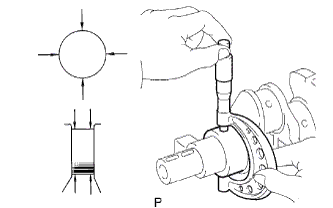 |
If necessary, grind and hone the main journals and/or crank pins.
Grind and hone the main journals and/or crank pins to the finished undersized diameter.
Install new main journals and/or crankshaft pin undersized bearings.
| 18. INSPECT CRANKSHAFT BEARING CAP BOLT |
 |
Using a vernier caliper, measure the minimum diameter of the compressed thread at the measuring point.
- Standard diameter:
- 13.500 to 14.000 mm (0.5315 to 0.5512 in.)
- Minimum diameter:
- 12.60 mm (0.4961 in.)